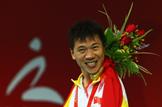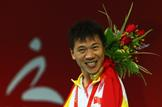网址:http://m.1010jiajiao.com/timu3_id_2397911[举报]

He Junquan is a Chinese swimmer and has won many Paralympic(残奥会) gold medals. Born in Jingmen, Hubei province, He Junquan was a healthy boy. But one day at the age of three, he climbed up to the high-voltage electricity(高压线) box and lost both of his arms forever. He became a disabled boy!
From then on he learnt to do everything with his feet: writing, eating, getting dressed and taking things. Seeing other pupils swimming in the river, he jumped in, too. Without arms, he suffered a lot in the river at the beginning. But he finally learnt to balance himself in water and could swim much faster than the other pupils. Once he even saved a little boy who fell into the water and couldn’t swim. His father was so happy to see that this son had a talent in swimming.
In 1995, He Junquan became a real swimmer. He practices swimming for more than four hours every day. Since 1996, he has won more than twelve gold medals of the world class. At the 2008 Summer Paralympics, he won a silver medal. Reporting on the competition at the 2008 Games, Will Swanton of the Sydney Morning Herald wrote:
“The Water Cube has been a sight for sore(气愤的) eyes. China’s He Junquan, with no arms, was leading the 50m backstroke(仰泳) final. … He came to the finish— and had to crash into the wall with his head. As he slowed down to lessen(减少) the impact(撞击力), Brazilian Daniel Dias hit the wall first with a hand. You’ve never heard a silence like it.”
【小题1】What happened to He Junquan when he was three?
| A.He climbed up the tree but failed onto the ground. |
| B.He saved a little boy who fell into the river and couldn’t swim. |
| C.He climbed up to the high-voltage electricity box and lost his two arms. |
| D.He began to practice swimming in the swimming pool with the other children. |
| A.With his feet. | B.With his mouth. |
| C.With his legs. | D.With his hands. |
| A.Only one. | B.Less than four. | C.About ten. | D.More than twelve. |
| A.He Junquan should not take part in the 2008 Games. |
| B.Daniel Dias didn’t hit the wall first at the 2008 Games. |
| C.The match was a little unfair for He Junquan because he had no arms. |
| D.He Junquan swam a little faster than Daniel Dias but he won a gold medal. |
| A.A Terrible Accident. | B.A Disabled Boy. |
| C.An Unforgettable Experience. | D.A Hero without Arms. |

He Junquan is a Chinese swimmer and has won many Paralympic(残奥会) gold medals. Born in Jingmen, Hubei province, He Junquan was a healthy boy. But one day at the age of three, he climbed up to the high-voltage electricity(高压线) box and lost both of his arms forever. He became a disabled boy!
From then on he learnt to do everything with his feet: writing, eating, getting dressed and taking things. Seeing other pupils swimming in the river, he jumped in, too. Without arms, he suffered a lot in the river at the beginning. But he finally learnt to balance himself in water and could swim much faster than the other pupils. Once he even saved a little boy who fell into the water and couldn’t swim. His father was so happy to see that this son had a talent in swimming.
In 1995, He Junquan became a real swimmer. He practices swimming for more than four hours every day. Since 1996, he has won more than twelve gold medals of the world class. At the 2008 Summer Paralympics, he won a silver medal. Reporting on the competition at the 2008 Games, Will Swanton of the Sydney Morning Herald wrote:
“The Water Cube has been a sight for sore(气愤的) eyes. China’s He Junquan, with no arms, was leading the 50m backstroke(仰泳) final. … He came to the finish— and had to crash into the wall with his head. As he slowed down to lessen(减少) the impact(撞击力), Brazilian Daniel Dias hit the wall first with a hand. You’ve never heard a silence like it.”
小题1:What happened to He Junquan when he was three?
| A.He climbed up the tree but failed onto the ground. |
| B.He saved a little boy who fell into the river and couldn’t swim. |
| C.He climbed up to the high-voltage electricity box and lost his two arms. |
| D.He began to practice swimming in the swimming pool with the other children. |
| A.With his feet. | B.With his mouth. |
| C.With his legs. | D.With his hands. |
| A.Only one. | B.Less than four. | C.About ten. | D.More than twelve. |
| A.He Junquan should not take part in the 2008 Games. |
| B.Daniel Dias didn’t hit the wall first at the 2008 Games. |
| C.The match was a little unfair for He Junquan because he had no arms. |
| D.He Junquan swam a little faster than Daniel Dias but he won a gold medal. |
| A.A Terrible Accident. | B.A Disabled Boy. |
| C.An Unforgettable Experience. | D.A Hero without Arms. |

He Junquan is a Chinese swimmer and has won many Paralympic(残奥会) gold medals. Born in Jingmen, Hubei province, He Junquan was a healthy boy. But one day at the age of three, he climbed up to the high-voltage electricity(高压线) box and lost both of his arms forever. He became a disabled boy!
From then on he learnt to do everything with his feet: writing, eating, getting dressed and taking things. Seeing other pupils swimming in the river, he jumped in, too. Without arms, he suffered a lot in the river at the beginning. But he finally learnt to balance himself in water and could swim much faster than the other pupils. Once he even saved a little boy who fell into the water and couldn’t swim. His father was so happy to see that this son had a talent in swimming.
In 1995, He Junquan became a real swimmer. He practices swimming for more than four hours every day. Since 1996, he has won more than twelve gold medals of the world class. At the 2008 Summer Paralympics, he won a silver medal. Reporting on the competition at the 2008 Games, Will Swanton of the Sydney Morning Herald wrote:
“The Water Cube has been a sight for sore(气愤的) eyes. China’s He Junquan, with no arms, was leading the 50m backstroke(仰泳) final. … He came to the finish— and had to crash into the wall with his head. As he slowed down to lessen(减少) the impact(撞击力), Brazilian Daniel Dias hit the wall first with a hand. You’ve never heard a silence like it.”
- 1.
What happened to He Junquan when he was three?
- A.He climbed up the tree but failed onto the ground
- B.He saved a little boy who fell into the river and couldn’t swim
- C.He climbed up to the high-voltage electricity box and lost his two arms
- D.He began to practice swimming in the swimming pool with the other children
- A.
- 2.
How did He Junquan do everything after he became disabled?
- A.With his feet
- B.With his mouth
- C.With his legs
- D.With his hands
- A.
- 3.
How many gold medals did He Junquan win after he became a real swimmer?
- A.Only one
- B.Less than four
- C.About ten
- D.More than twelve
- A.
- 4.
What might Swanton’s report want to tell us?
- A.He Junquan should not take part in the 2008 Games
- B.Daniel Dias didn’t hit the wall first at the 2008 Games
- C.The match was a little unfair for He Junquan because he had no arms
- D.He Junquan swam a little faster than Daniel Dias but he won a gold medal
- A.
- 5.
What’s the best title for the passage?
- A.A Terrible Accident
- B.A Disabled Boy
- C.An Unforgettable Experience
- D.A Hero without Arms
- A.
| |||||||||||||||||||||||||||||||||||||||||||||||||||||||||||||||||||||||||||||||||||||||||||||||||||||||||||||||||||||||||||||||||||||||||||||||||||||||||||||||||||||||||||||||||||||||||||||||||||||||||||||||||||||||||||||||||||||||||||||||||||||||||||||||||||||||||||||||||||||||||||
A 10-year-old boy decided to study judo* although he had lost his left arm in a car accident. The boy began 11 with a Japanese judo coach. The boy was doing well, so he couldn’t know 12 the coach taught him only one move. After three months of 13 , the boy finally asked, “Sir, should I start to learn more moves?”
“This is the only move you know, 14 this is the only move you’ll need to know,” the coach replied. Not quite understanding, but the boy 15 his teacher. So he kept training.
Several months 16 , the coach took the boy to his first match. To his surprise, the boy 17 won his first match. The second match was more difficult. But after some time, his opponent* became impatient. The boy used his one move to win the match again. 18 of the people in the stadium were amazed by his success. The boy was now in the finals.
This time, his opponent was bigger, 19 , and more experienced. For a while, the boy seemed to 20 . Worried that the boy 21 get hurt, someone shouted, “Stop! Stop! Stop!” However, the coach said, “No, 22 .”
As the match was keeping on, his opponent made a big mistake: he dropped his guard. Quickly, the boy used his move to 23 him. The boy won the final match. He was the winner.
24 the way home, the boy asked his coach: “Sir, how did I win the match with only one move?”
“You won for 25 reasons,” the coach answered, “First, you’ve almost known one of the most difficult moves in all of judo. And second, the only defense* for that move is for your opponent to catch your left arm.”
The boy’s greatest weakness had become his greatest strength.
1.A. class B. learn C. lessons D. work
2.A. why B. what C. when D. how
3.A. doing B. running C. writing D. training
4.A. so B. but C. or D. until
5.A. asked for B. depended on C. believed in D. came out
6.A. later B. ago C. before D. after
7.A. slowly B. easily C. carefully D. hardly
8.A. None B. Both C. All D. Either
9.A. weaker B. worse C. cuter D. stronger
10.A. win B. lose C. take D. throw
11.A. might B. can C. must D. should
12.A. stop B. play C. stay D. continue
13.A. fail B. win C. get D. beat
14.A. In B. At C. On D. For
15.A. one B. two C. three D. four
查看习题详情和答案>>